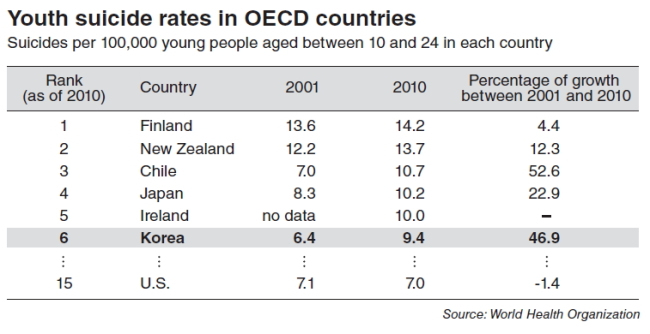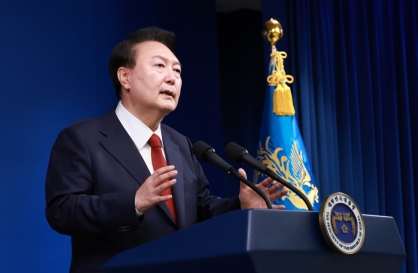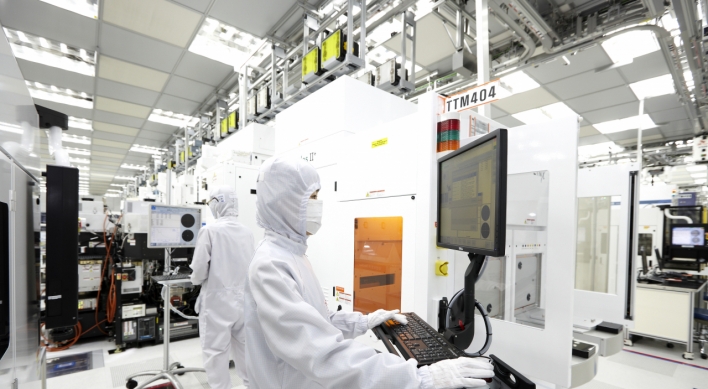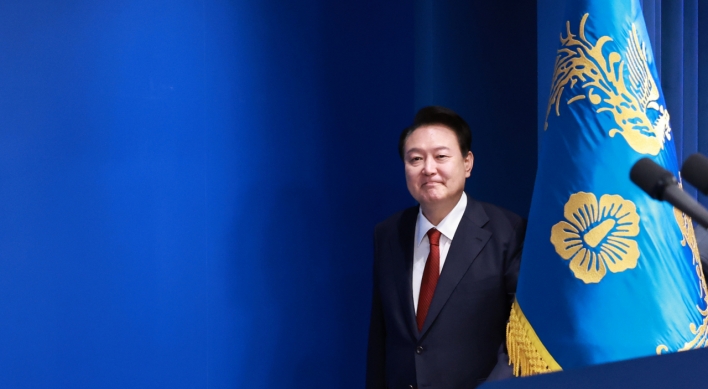Suicide, a preventable tragedy
Doctors urge government to develop measures to curb growing suicide rate
By Korea HeraldPublished : Sept. 12, 2013 - 21:05
Suicide is preventable, experts say, but only when society starts to take it seriously enough and make more conscious and concerted efforts, areas in which Korea still has a long way to go.
“People who commit suicide constantly talk about death and tell their family or friends that they want to die. People near them must take that as an urgent sign and pay the utmost attention to them,” said Lee Weon-young, a preventive medicine professor at ChungAng University in Seoul.
“If concerned, their status must be reported to suicide preventive centers nearby by simply making a call.”
Medical treatment is important, as many tend to suffer from depression.
“It is related to a hormonal imbalance in the brain. Taking medicine will greatly help,” Lee added.
Suicide is a serious public health issue here as Korea has one of the highest suicide rates in the world. In 2011, 15,681 people killed themselves, according to a report by the Korean National Police Agency. The number shows that an average of 43 people committed suicide a day.
The country’s suicide rate, particularly among the young and the elderly, has rapidly increased. More than one-third of suicide cases involved senior citizens aged 60 or older, the police report said.

The number of suicides per 100,000 Koreans aged 10 to 24 also surged 47 percent to 9.4 in 2010 from 6.4 in 2001 while the average rate among OECD countries fell to 6.5 from 7.7. The growth in suicide in Korea ranked second among the countries, following Chile with 53 percent.
To significantly reduce the number of people taking their own lives, the government should pay more attention to the issue and come up with effective measures and sufficient funding, experts stressed.
“Suicide is not just a personal tragedy but also a social epidemic that affects the whole society, regardless of gender and age. However, not only the public but also the government doesn’t seem to take the issue seriously,” said Kim Hyun-jeong, a psychiatrist at the National Medical Center.
It has been posited that Korea’s super-competitive social environment, widening economic gap and lack of a social safety net have contributed to the suicide rate.
These are, however, only hypothetical reasons, ChangAng University professor Lee said.
“The government should find what really drives many Koreans into tragedy and find the solutions for that,” he said.
To determine the causes for suicide and find better solutions, advanced countries like Finland and Japan conduct a “psychological autopsy” nationwide.
Psychological autopsy refers to a procedure for determining the deceased’s state-of-mind before death. It involves interviews with families, friends and others who had contact with the person before their death, as well as collecting personal information and medical and police reports.
The Ministry of Health and Welfare put forward a new law in 2012 to expand its support to suicide survivors, and to promote a prevention campaign nationwide.
Based on the law, the ministry launched the Korea Suicide Preventive Center, a sort of control tower that supervises 200 local consulting centers across the country. The ministry spends 3 billion won ($2.76 million) a year for overall projects designed to stop people from committing suicide, according to ministry officials.
Kim at the National Medical Center said, however, that Japan spent about 300 billion won a year to operate comprehensive suicide prevention programs.
By Cho Chung-un (christory@heraldcorp.com)
“People who commit suicide constantly talk about death and tell their family or friends that they want to die. People near them must take that as an urgent sign and pay the utmost attention to them,” said Lee Weon-young, a preventive medicine professor at ChungAng University in Seoul.
“If concerned, their status must be reported to suicide preventive centers nearby by simply making a call.”
Medical treatment is important, as many tend to suffer from depression.
“It is related to a hormonal imbalance in the brain. Taking medicine will greatly help,” Lee added.
Suicide is a serious public health issue here as Korea has one of the highest suicide rates in the world. In 2011, 15,681 people killed themselves, according to a report by the Korean National Police Agency. The number shows that an average of 43 people committed suicide a day.
The country’s suicide rate, particularly among the young and the elderly, has rapidly increased. More than one-third of suicide cases involved senior citizens aged 60 or older, the police report said.

The number of suicides per 100,000 Koreans aged 10 to 24 also surged 47 percent to 9.4 in 2010 from 6.4 in 2001 while the average rate among OECD countries fell to 6.5 from 7.7. The growth in suicide in Korea ranked second among the countries, following Chile with 53 percent.
To significantly reduce the number of people taking their own lives, the government should pay more attention to the issue and come up with effective measures and sufficient funding, experts stressed.
“Suicide is not just a personal tragedy but also a social epidemic that affects the whole society, regardless of gender and age. However, not only the public but also the government doesn’t seem to take the issue seriously,” said Kim Hyun-jeong, a psychiatrist at the National Medical Center.
It has been posited that Korea’s super-competitive social environment, widening economic gap and lack of a social safety net have contributed to the suicide rate.
These are, however, only hypothetical reasons, ChangAng University professor Lee said.
“The government should find what really drives many Koreans into tragedy and find the solutions for that,” he said.
To determine the causes for suicide and find better solutions, advanced countries like Finland and Japan conduct a “psychological autopsy” nationwide.
Psychological autopsy refers to a procedure for determining the deceased’s state-of-mind before death. It involves interviews with families, friends and others who had contact with the person before their death, as well as collecting personal information and medical and police reports.
The Ministry of Health and Welfare put forward a new law in 2012 to expand its support to suicide survivors, and to promote a prevention campaign nationwide.
Based on the law, the ministry launched the Korea Suicide Preventive Center, a sort of control tower that supervises 200 local consulting centers across the country. The ministry spends 3 billion won ($2.76 million) a year for overall projects designed to stop people from committing suicide, according to ministry officials.
Kim at the National Medical Center said, however, that Japan spent about 300 billion won a year to operate comprehensive suicide prevention programs.
By Cho Chung-un (christory@heraldcorp.com)
-
Articles by Korea Herald










![[K-pop’s dilemma] Time, profit pressures work against originality](http://res.heraldm.com/phpwas/restmb_idxmake.php?idx=644&simg=/content/image/2024/05/08/20240508050705_0.jpg&u=20240508171126)








![[Today’s K-pop] Stray Kids to drop new album in July: report](http://res.heraldm.com/phpwas/restmb_idxmake.php?idx=642&simg=/content/image/2024/05/09/20240509050659_0.jpg&u=)